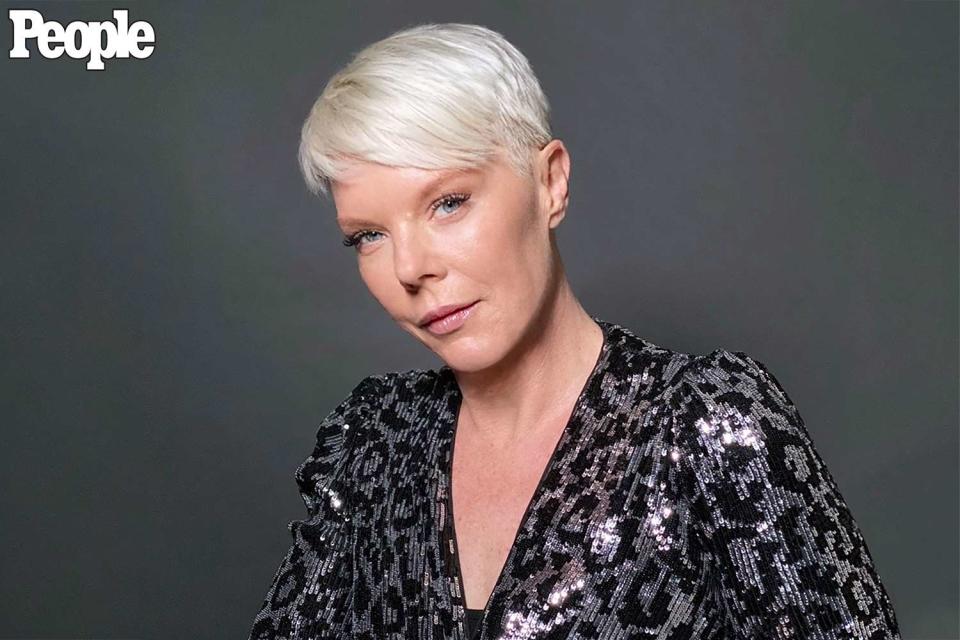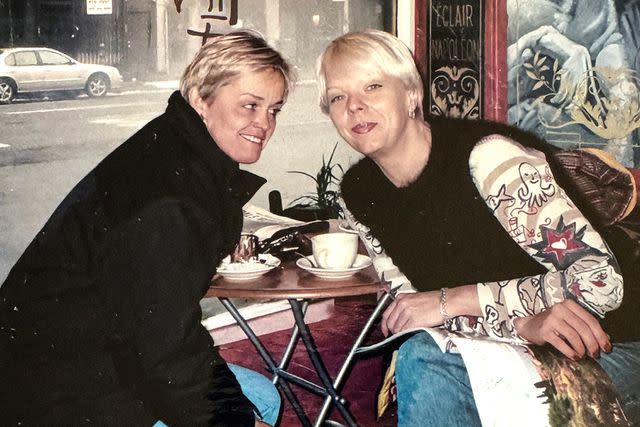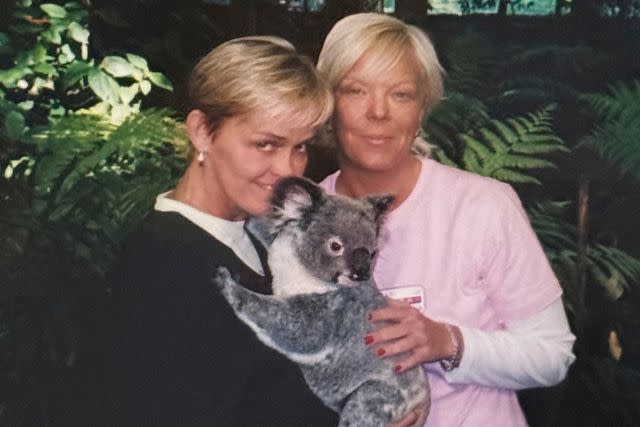Bravo's Tabatha Coffey Reveals 25-Year Love Story and How Partner's Death Changed Her Life: ‘It Broke Me Open’ (Exclusive)
"My intention is to help others, because we are all going to join the club," she tells PEOPLE in an emotional new interview

Ty Jennings
Tabatha CoffeyFor the first time, Tabatha Coffey is opening up about her partner of 25 years, Diane Keeler, who died in 2022
Coffey cared for Keeler in the last eight years of Keeler's life, as she faced complications from cancer and a stroke
Coffey has begun a new chapter as a coach and speaker, hoping to show others going through similar situations that they aren't alone
Tabatha Coffey — celebrated hairstylist, former Bravo host and tart-tongued, tough-loving reality TV personality — takes a deep breath and then begins to share a part of her life, publicly, for the first time.
Ever.
“If I cry, ignore me,” she tells PEOPLE over the course of an emotional, nearly two-hour interview about her romance with her partner of 25 years, Diane Keeler, and what she learned as she cared for Keeler through eight years of cancer and stroke complications before Keeler died in June 2022.
"She taught me a lot in life and death," Coffey, 57, says now, looking back on her private love and loss.
"I'm not the same woman and I'm okay with it," she says. "I don't want to be the same woman."
For years, Coffey and Keeler kept their relationship out of the spotlight. Keeler, a New York City native more than a decade older than Coffey, had lived a full life in her earlier years and didn’t have interest in the swirl of events and travel required by Coffey’s burgeoning hairstyling or TV career, Coffey says: “It just wasn't her thing."
And Coffey, for her part, was sensitive to the scrutiny her career brought, compounded by her reality persona and the challenges faced by being an out gay woman.
While she says she embraced professional opportunities “gratefully and gleefully,” she also knew that decision didn’t include her loved ones.
“I signed up for this. No one I love signed up for this,” she says.
Still, Coffey and Keeler savored their time together, either at home on the East Coast or while traveling.
"There's a reason I have been so protective and private .… My life was precious,” Coffey says now, adding, “The fact that I could leave L.A. and I could come back home and come back to someone that cared about me but also someone that let me go and be me … that was such a precious thing to have and such a rare commodity that I just wrapped that up and kept it very close and very quiet.”
For more about Tabatha Coffey's private romance and her grief journey, pick up this week's issue of PEOPLE, on newsstands Friday, or subscribe.

Courtesy Tabatha Coffey
Tabatha Coffey (right) and her partner, Diane Keeler, in New York City ca. 2007: Coffey says they were likely in the city "for brunch, to walk around and relax."How they met
Coffey was already a successful stylist and quite content when she met Keeler, who was a client at the salon where she worked in New Jersey as the winter of 1997 turned into early 1998. (All these years later, the exact anniversary is fuzzy.)
“There was a spark,” Coffey recalls, but the two danced around one another for “a while” until Keeler made the first move — taking her for steak frites at a “very small, romantic and French” restaurant in SoHo.
They fell fast. “Diane was funny, like dry funny, and could make me laugh like no one else,” Coffey says. “She was patient as a saint, because she put up with me.”
Before long, they were living together in New Jersey, Coffey’s home after relocating from Australia, where she was born and raised and which she left in young adulthood.
Keeler “loved the beach and to go to the shore and walk our dog or go for bike rides and spend time outside and garden,” Coffey says. For a time, the couple shared a “delicious little toy poodle” named Maximus.
Meanwhile, she notes with a laugh, “I loved to cook and she liked to eat, so it was quite perfect really.” It all just fit.
“Diane used to say I always surprised her — but she would always surprise me with her depth of grace and kindness,” Coffey says. “Maybe that’s something we did for each other.”
Years of health struggles
Coffey first noticed something was wrong with Keeler over Christmas in 2013. She’d started to mix up words, like calling a light switch a banana. Coffey, who traveled often, made her promise to see a doctor, which Keeler, a corporate manager, finally did when she found herself at work one day unable to communicate at all.
In January 2014, Keeler was diagnosed with stage 4 glioblastoma, an aggressive form of brain cancer which can kill patients within months.
But Coffey and Keeler never discussed the grim risk of her prognosis — not through surgery, the blistering rounds of chemotherapy or rehabilitation. “I never called it stage 4, because everyone knows what that means,” Coffey says. “Her job was to rest her body. My job was to take care of everything else.”
By 2017, “things seemed to be okay,” she says. “Diane was back to being self-sufficient. And then she had a major stroke.”
In Keeler’s final years, she was robbed of much of her mobility and speech and needed round-the-clock support at home. But she didn’t lose her determination to recover — celebrating milestones like being able to walk again, with assistance, however briefly. Coffey became her cheerleader, just as single minded.
“Every choice had to be the best thing for her, even if it wasn't easy for me,” Coffey says.
But cherishing Keeler and the life they had built at the same time she was unable to stop her partner's decline exacted a complicated emotional toll: “What I told myself some days is, I don't know how I'm going to do this. I don't know if I've got enough strength. … I just was so frustrated I couldn't fix or control the situation, and that's all I wanted to do.”

Courtesy Tabatha Coffey
Tabatha Coffey (right) and partner Diane Keeler visiting Steve Irwin Zoo in Queensland, Australia, circa 2007.Coffey’s world “got incredibly small, I’ll use the word ‘insular,’ “ she says.
During those select times when Coffey would travel, she was always on “high alert,” even sneaking her cellphone into her bra while on stage in case there was an emergency.
“How does it change your life?” she says. “I think it, oh, puts everything in perspective.”
Gratefully, she says, she learned she wasn’t unique. She found solace in online groups and turned first to therapy and then a grief coach — a journey that inspired her next professional chapter, as personal coach, mentor and speaker herself.
Last year, she launched the online support community ThriveHive and also hosts the new Creative Thrive podcast.
“No one cares for the caregiver,” she says. “That's why it's so important for caregivers to find the support they need and also to be able to give that to themselves.”
Keeler was eventually also diagnosed with stage 4 lung cancer, according to Coffey, and her health grew worse over time before rapidly deteriorating at the end.
She died at home from the lung cancer almost exactly two years ago, on June 10, 2022, surrounded by family as Coffey played some of her favorite music from Andrea Bocelli, Whitney Houston and more. She was 67.
“She got to a point that I don't think she was really there anymore,” Coffey recalls. “It was just waiting for her body to catch up to the leaving. It was peaceful and pain-free.”
Now without the woman she calls her “anchor,” Coffey is still discovering who she is after being transformed by Keeler: "It broke me open," she says.
Throughout the end of Keeler’s life, Coffey says she learned painful, important lessons about a universal fact of life often pushed just out of view: how to lose the ones you love.
Ever the teacher, she wants to share.
“My intention is to help others, because we are all going to join the club,” she says. “And I hope that by talking about it, it reminds people that they're not alone.”
For more People news, make sure to sign up for our newsletter!
Read the original article on People.

 Yahoo News
Yahoo News 
